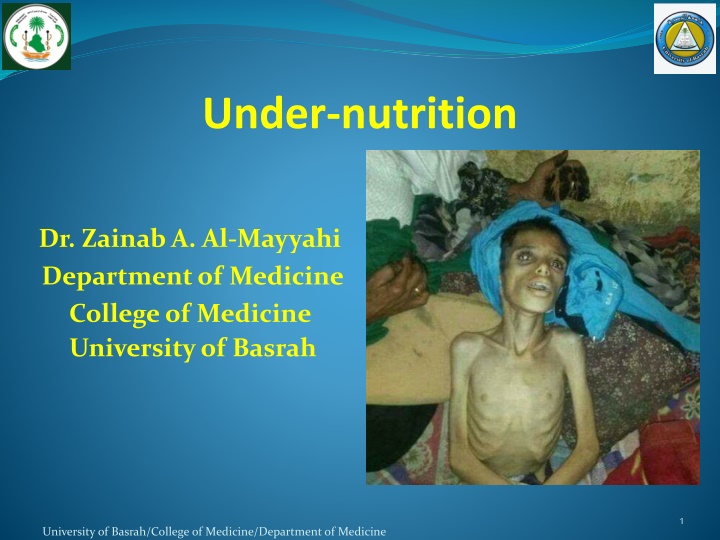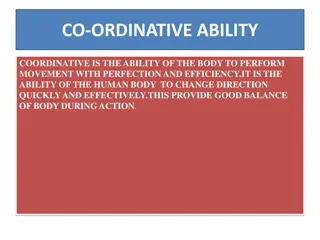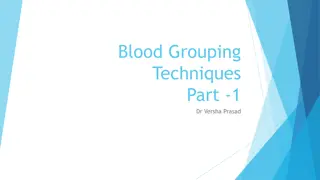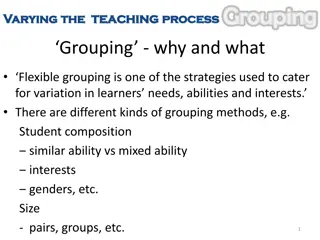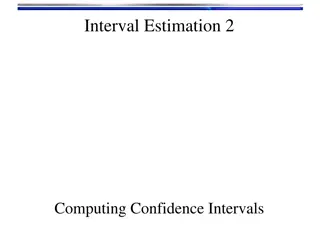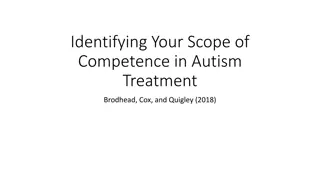Changing Teachers' Minds on Grouping by Ability: Control, Competence, Confidence
The project focused on challenging fixed ability grouping in schools, emphasizing co-agency, confidence, and competence among teachers and learners. Through self-reflection and community collaboration, the study aimed to shift teacher mindsets towards inclusive practices, fostering learner agency and self-efficacy. Key findings highlighted the importance of relinquishing control, adapting language, and promoting trust as precursors to co-agency in the learning journey.
Download Presentation

Please find below an Image/Link to download the presentation.
The content on the website is provided AS IS for your information and personal use only. It may not be sold, licensed, or shared on other websites without obtaining consent from the author.If you encounter any issues during the download, it is possible that the publisher has removed the file from their server.
You are allowed to download the files provided on this website for personal or commercial use, subject to the condition that they are used lawfully. All files are the property of their respective owners.
The content on the website is provided AS IS for your information and personal use only. It may not be sold, licensed, or shared on other websites without obtaining consent from the author.
E N D
Presentation Transcript
Under-nutrition Dr. Zainab A. Al-Mayyahi Department of Medicine College of Medicine University of Basrah 1 University of Basrah/College of Medicine/Department of Medicine
Objectives By the end of this lecture you should be able to: Identify patients at risk of under-nutrition Understand causes of under-nutrition Describe the clinical features of under- nutrition Assess and classify severity of under-nutrition Manage different types of under-nutrition 2 University of Basrah/College of Medicine/Department of Medicine
Under nutrition is suspected when there is one of the fallowing conditions Unintentional weight loss around 10% in preceding 3 months Body weight is < 90% of ideal for height BMI < 18.5 3 University of Basrah/College of Medicine/Department of Medicine
Causes of under-nutrition and weight loss in adults Decreased energy intake Famine, poverty Persistent vomiting ( GIT diseases, cancer) Anorexia Malabsorption. Maldigestion. 4 University of Basrah/College of Medicine/Department of Medicine
Increased energy expenditure Increased BMR (thyrotoxicosis, burn) Excessive physical activity Energy loss (e.g. diabetes) Impaired energy storage ( Addison s disease) 5 University of Basrah/College of Medicine/Department of Medicine
Clinical features of under- nutrition Weight loss. Craving for food. Amenorrhea or impotence. Lax, pale, dry skin. Hair loss. Muscle-wasting and weakness Decrease subcutaneous fat and prominent ribs 6 University of Basrah/College of Medicine/Department of Medicine
Clinical features of under- nutrition Hypothermia, bradycardia, hypotension. Edema (famine Edema). Apathy (expressionless face). Increased susceptibility to infections. Symptoms and signs of vitamins and minerals deficiencies 7 University of Basrah/College of Medicine/Department of Medicine
8 University of Basrah/College of Medicine/Department of Medicine
University of Basrah/College of Medicine/Department of Medicine 9
Under nutrition in children Marasmus Kwashiorkor 10 University of Basrah/College of Medicine/Department of Medicine
Clinical assessment (BMI) BMI (kg/m2) classification 18.5 Under-nutrition 18.4-17 Mild 17-16 Moderate 16> Severe 11 University of Basrah/College of Medicine/Department of Medicine
Clinical assessment triceps skin fold thickness (mm) 12 University of Basrah/College of Medicine/Department of Medicine
Clinical assessment midarm muscle circumference (cm) 13 University of Basrah/College of Medicine/Department of Medicine
Investigations Hypoglycemia Ketosis Anemia , leucopenia and thrombocytopenia. ECG shows sinus bradycardia and low voltage Investigations for the underlying cause 14 University of Basrah/College of Medicine/Department of Medicine
Management of under-nutrition Treatment of underlying causes if present. Mild (BMI 17-18.5) not at danger. Moderate (BMI 16-17) require extra feeding. Severe (BMI < 16 ) require hospital care. 15 University of Basrah/College of Medicine/Department of Medicine
Treatment of severe under- nutrition In severe under nutrition, there is suppressed insulin secretion, atrophy of the intestinal epithelium & pancreatic exocrine and bile are dilute Re-feeding should be slow using special diets supplied with essential micronutrients. 30 kcal/kg is usually requires (1500-2000 kcal/day). Aim is to increase body weight by 5% per month. University of Basrah/College of Medicine/Department of Medicine 16
Routes of feeding 1- Normal enteral (oral ) feeding. 2- Enteral tube feeding for patients unable to swallow like CVA patents and throat surgery *Nasogastric tube feeding. *percutaneous endoscopic gastrostomy (PEG) 3- Parenteral feeding : Directly through the circulation when other routes are impossible. 17 University of Basrah/College of Medicine/Department of Medicine
18 University of Basrah/College of Medicine/Department of Medicine
F-75 Milk powder (25 g), sugar ( 70 g), cereal flour (35g) vegetable oil (27 g)& vitamins & minerals made up 1 L of water F-100 (1 L) contains milk powder (80 g), sugar (50 g), vegetable oil (60 g) and vitamin and mineral supplements (no cereal). 19 University of Basrah/College of Medicine/Department of Medicine
Re-feeding syndrome Observed in rapid correction of malnutrition due release of insulin which facilitate entry of K, Mg & Phosphate inside the cells leading to electrolytes disturbance s Nausea , vomiting, muscle weakness seizures, respiratory depression and even cardiac arrest andsudden death can occur 20 University of Basrah/College of Medicine/Department of Medicine
Total parenteral nutrition (TPN) Expensive and carries high risk of complications Site of delivery should be a large central vein. A combination of dextrose , amino acids, lipids and water provides the basic feeding solution to which vitamins and trace menials are added. 21 University of Basrah/College of Medicine/Department of Medicine
Indications of TPN long term Temporary Extensive bowel resection. Mesenteric infraction. crohn s disease. Scleroderma Radiation enteritis Sever diarrhoea Intractable vomiting. Patients kept nil by mouth. 22 University of Basrah/College of Medicine/Department of Medicine
Complication of TPN Thrombophlebitis. Infection. Pneumothorax. Hypo or hyperglycemia. Electrolytes disturbance Refeeding syndrome . Abnormal renal and liver function tests. Hyperlipidemia and gallstones. 23 University of Basrah/College of Medicine/Department of Medicine
under-nutrition in hospital Under-nutrition is a common problem in the hospital setting ( one third of patients): *Poor appetite. *Concurrent illness. *Feeding difficulties. * nil by mouth for long time. 24 University of Basrah/College of Medicine/Department of Medicine
Consequences of under-nutrition in hospital Impaired immunity. Muscle weakness. Delayed wound healing. Poor response to treatment. Increase post operative infection. 25 University of Basrah/College of Medicine/Department of Medicine
Nutritional support in hospital Try to encourage normal balanced diet. If not adequate, add dietary supplements. Tube feeding for those unable to swallow. Parenteral nutrition. 26 University of Basrah/College of Medicine/Department of Medicine
Summary Under-nutrition is a significant cause of morbidity and mortality (50% of deaths in children) Famine and poverty is the main cause Weight loss and decreased BMI is the most common presentation Severe under-nutrition needs hospital care Re-feeding should be slow to prevent re-feeding syndrome 27 University of Basrah/College of Medicine/Department of Medicine
